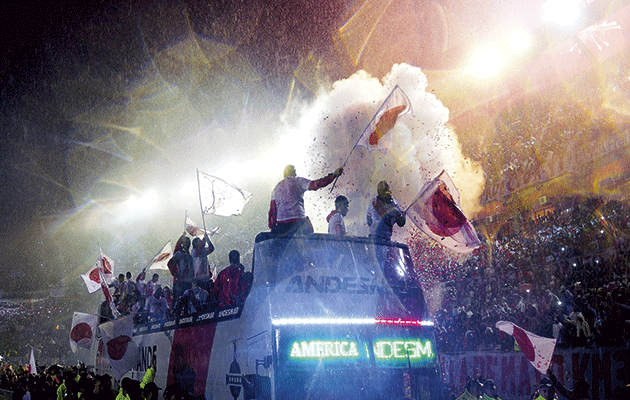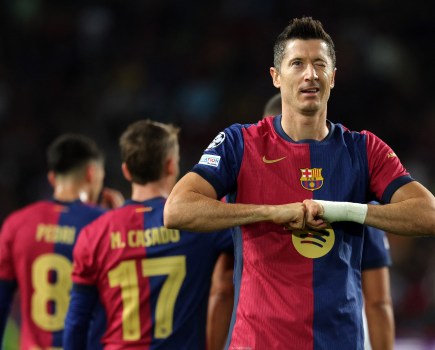After the lap of honour and the official photos with the trophy, River Plate players donned T-shirts especially made for the occasion. The inscription, loosely translated, read: “You Don’t Abandon a Style of Play.” The quote is loaded with meaning for River as it taps into the club’s past and present. It is also a taunt at their great rivals, Boca Juniors.
Tigres of Mexico were dispatched 3-0 on aggregate in the Final, but the springboard for River Plate’s third Libertadores Cup success was victory over Boca in the round of 16. Boca were expelled from the competition after a small group of supporters sprayed River Plate players with a homemade pepper spray. Since then, River fans have taunted their neighbours with a chant about “giving up” or “abandoning”. River’s players have also been filmed singing the song.
But this Libertadores triumph is about a far bigger picture than settling scores in a local rivalry. For River, this is a moment of unadulterated glory that crowns a stunning 18 months. It completes the club’s resurrection after its lowest point four years ago and brings to an end two decades without winning the continent’s most important title. The torrential rain in Buenos Aires on the night only added an extra element of the epic to the title win.
In May 2014, River Plate were Argentinian league champions and they went on to win the domestic Super Cup under Ramon Diaz. Although the coach then quit, River Plate president Rodolfo D’Onofrio assured supporters “this has only just started”. Sports director Enzo Francescoli pushed for Marcelo Gallardo, the young coach and former River Plate player, to replace Diaz and the board heeded the Uruguayan’s choice, despite preferring more experienced alternatives.
Under Gallardo, River immediately produced a stylish brand of play. They won the Sudamericana Cup, also defeating Boca Juniors along the way, and then won the South American Super Cup – making them the first club to hold of all three continental trophies at the same time.
With silverware in the trophy cabinet, a strong squad, a clear identity of play and a healthy bank balance, this was all in stark contrast to the club’s recent history.
Four years ago, River Plate were in the second tier. Disastrous administrations had lead the club to relegation and the institution was in complete disarray. For that season, former youth-team product Fernando Cavenaghi returned, offering to play for whatever the club could afford. The striker was captain and top scorer in River’s worst-ever season, and his gesture of returning to the club when it most needed him made him a club icon.
Cavenaghi had been struggling with form and fitness this year, and was behind other strikers at the club. Yet injury to Rodrigo Mora allowed him to start the second leg of the Libertadores Final against Tigres, along with three fellow veterans of the campaign in the second division: Leo Ponzio, Jonathan Maiadana, and one of the goalscorers on the night, Carlos Sanchez. In these players, but in Cavenaghi in particular, was the story of River’s transformation.
Along with Sanchez, the other two goalscorers from the 3-0 win over Tigres also explain part of the story.
Lucas Alario was a virtually unknown striker at Colon when signed by Gallardo. His first start for the club was in the semi-final against Guarani, and in the second leg he scored the goal that secured the spot in the Final. His clinical finish on the stroke of half-time opened up the game against Tigres in River’s favour.
Defender Ramiro Funes Mori scored the third goal in the Final – and it was his brother, Rogelio Gabriel, who had been berated for missing goals when River were relegated. Ramiro not only scored vital goals for the club, he was also central to River’s impressive defensive line.
The Libertadores Cup win underlined the transformation at River Plate over the past four years, but also brought to an end a two-decade wait for the trophy. Despite boasting more Argentinian league championships than any other club, Independiente (seven), Boca Juniors (six) and Estudiantes (four) all have more Libertadores titles than River, whose only other victories were in 1986 and 1996.
The 1996 Libertadores Cup-winning generation were, in part, the architects of this year’s Libertadores success and River now look forward to the Club World Cup in Japan, where they fully expect to face Barcelona.
For that, the club, Gallardo and his players, will look to take inspiration from the generation of 1986, which not only won the Libertadores but were also world club champions.
By Joel Richards









